Hey, want to keep pests out of your garden without harsh chemicals? You’ve got options that are natural and effective, like planting marigolds or using garlic sprays. Start by picking up some marigold seeds, and plant them near your veggies—space them about 8-10 inches apart for best results. Curious about how garlic can help or other easy tricks? Stick around to uncover more pest-fighting secrets!
Contents
Marigold Planting
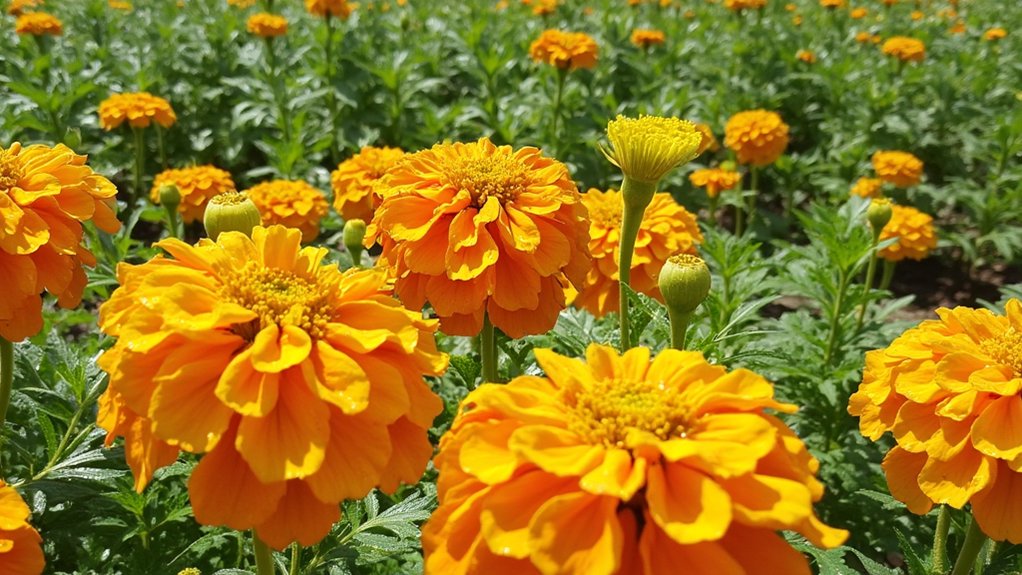
Hey, let’s plunge into marigold planting, a fantastic way to keep pests out of your garden naturally. These bright flowers aren’t just pretty; they release a scent that repels nasty bugs like nematodes and aphids. You’ve gotta try this simple trick!
Start by picking a sunny spot, as marigolds crave at least 6 hours of direct sunlight daily. Grab some seeds or seedlings from a nursery, and plant them about 10-12 inches apart in well-drained soil. Water them lightly, just enough to keep the soil moist, not soggy, for the first two weeks.
Space them near veggies like tomatoes or peppers for max pest control. Within 8-10 weeks, you’ll see blooms—and fewer pests sneaking around your garden!
Garlic Barrier Spray
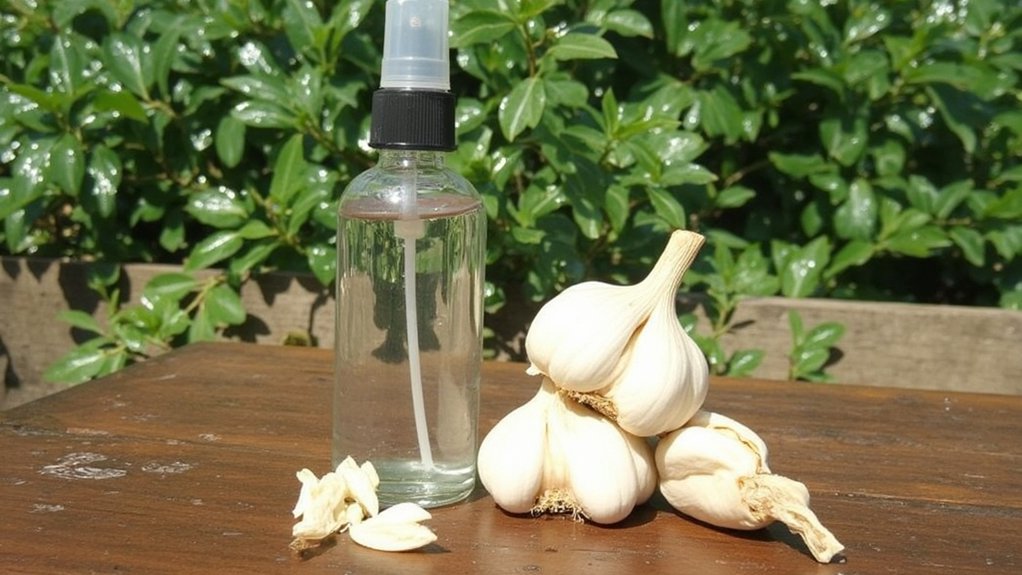
Let’s switch gears from marigolds and talk about another powerful pest deterrent, the garlic barrier spray. You’ve probably got garlic in your kitchen, so why not use it in your garden?
This spray’s a simple, stinky solution to keep pests like aphids and beetles away. Crush 4-5 cloves of garlic, mix with a quart of water, and let it steep for 24 hours. Strain it, add a teaspoon of dish soap, and pour into a spray bottle.
Now, apply it directly to your plants, focusing on the undersides of leaves where bugs hide. Reapply every 3-4 days, especially after rain, to maintain the barrier. It’s cheap, easy, and pests hate the smell—just don’t spray on windy days!
Neem Oil Application
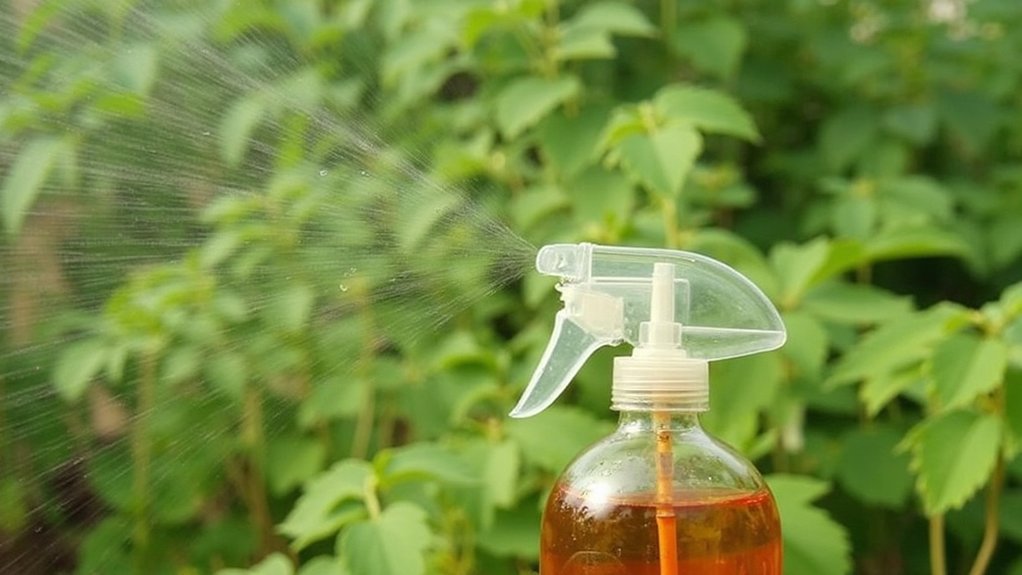
While garlic spray packs a punch, neem oil offers a different kind of defense for your garden. It’s a natural pesticide, extracted from neem tree seeds, and it works wonders. You’ll disrupt pests’ life cycles, like aphids and mites, without harsh chemicals.
Here’s how you apply it, step by step. Mix 2 tablespoons of neem oil with 1 gallon of water, add a teaspoon of mild dish soap to emulsify, and shake well. Spray this on your plants’ leaves, especially undersides, every 7 to 14 days, ideally in early morning or late evening to avoid sunburn.
Keep it consistent, and you’re set. Store the mix in a cool, dark place, and always test a small area first for plant sensitivity.
Companion Planting Strategy
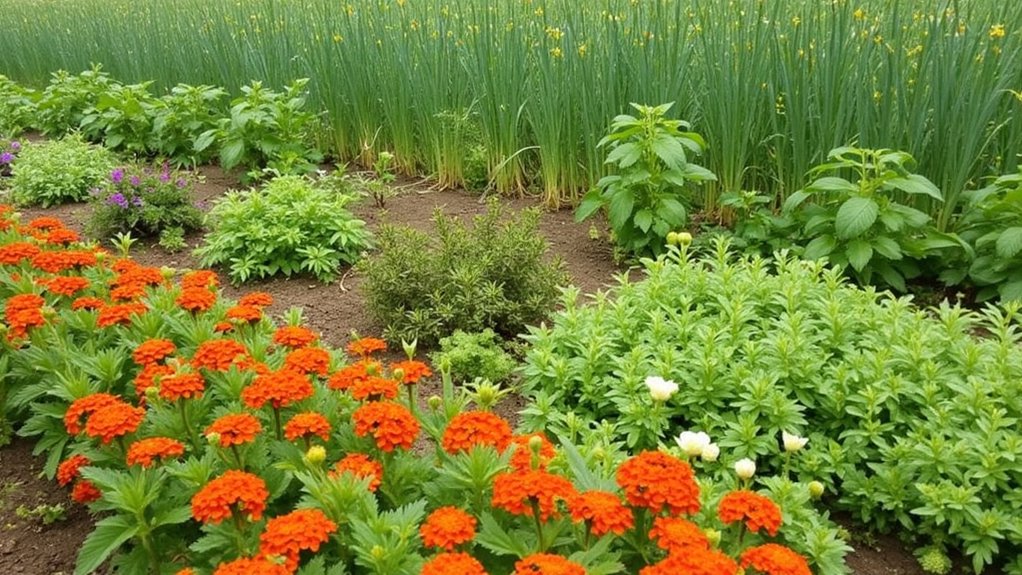
As you explore natural ways to protect your garden, consider the clever tactic of companion planting. It’s a smart, old-school method where you pair certain plants to deter pests naturally. Think of it as matchmaking for your veggies!
Start by planting marigolds near your tomatoes; their strong scent repels nematodes and whiteflies. Space them about 12 inches apart for the best coverage. Next, try basil alongside peppers—it wards off aphids while boosting growth. Sow basil seeds 6 inches from pepper plants, ideally in early spring.
Don’t just plant randomly, though. Research which combos work, like onions with carrots to fend off carrot flies. Keep a garden journal, noting what thrives. With a little planning, you’ll outsmart pests without harsh stuff!
Peppermint Oil Repellent
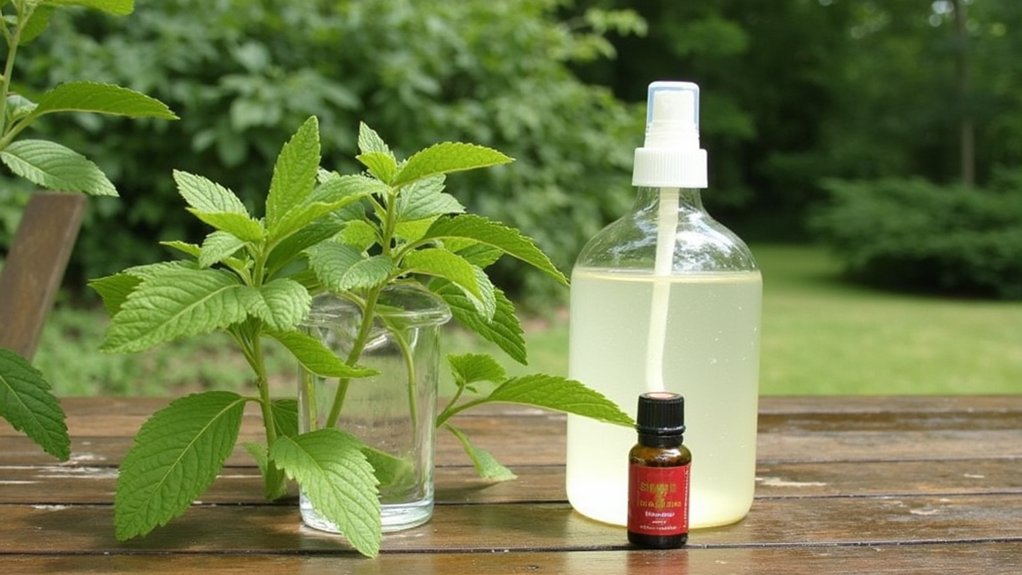
Dive right into another natural pest control trick with peppermint oil repellent. You’ve got a powerful ally here, as its strong scent repels ants, spiders, and even rodents.
Mix 10-15 drops of pure peppermint essential oil with 1 cup of water in a spray bottle. Shake it well, then spritz around garden edges, near plant bases, and entry points. Do this every 3-4 days, or after rain, to keep the scent strong.
Don’t drench your plants, though; a light mist works fine. Apply early in the morning or late afternoon to avoid leaf burn from midday sun. You’ll notice fewer pests creeping around within a week if you’re consistent. Keep a bottle handy for quick touch-ups, and watch your garden thrive naturally.
Basil Pest Deterrent
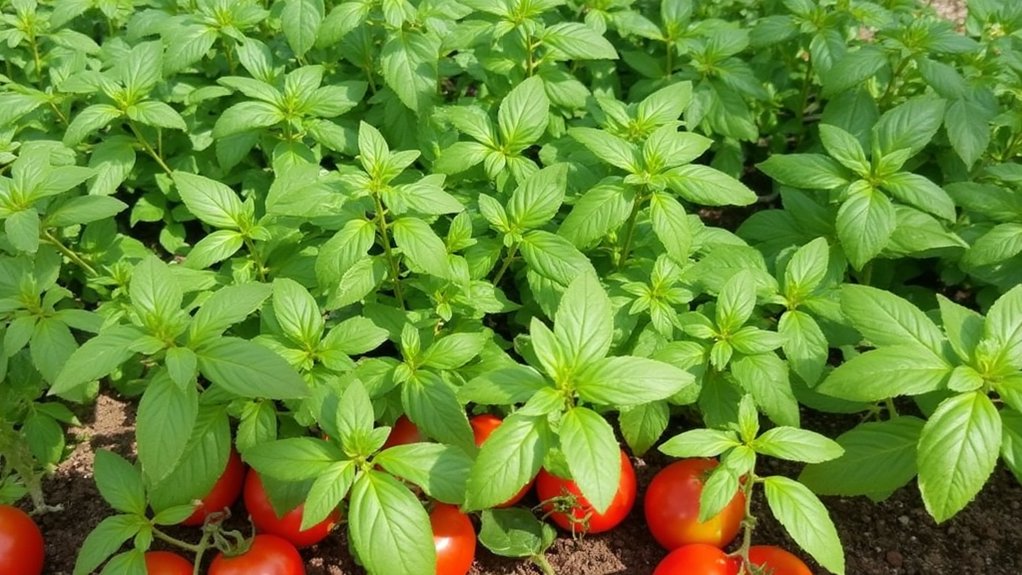
Hey there, let’s talk about using basil as a natural pest deterrent in your garden. This herb isn’t just for cooking; it’s a powerhouse against pests. Plant basil near tomatoes, peppers, or beans to repel flies and mosquitoes. It’s a simple, effective trick.
Here’s how you do it: grab some basil seedlings, and space them about 12 inches apart in well-drained soil. Make sure they get 6-8 hours of sunlight daily, and water them every few days, keeping soil moist but not soggy. Within 2-3 weeks, you’ll notice fewer buzzing critters. Pinch off leaves regularly to encourage growth.
Stick with this method, and your garden stays pest-free. Basil’s strong scent does the heavy lifting, so give it a try!
Lavender Pest Protection
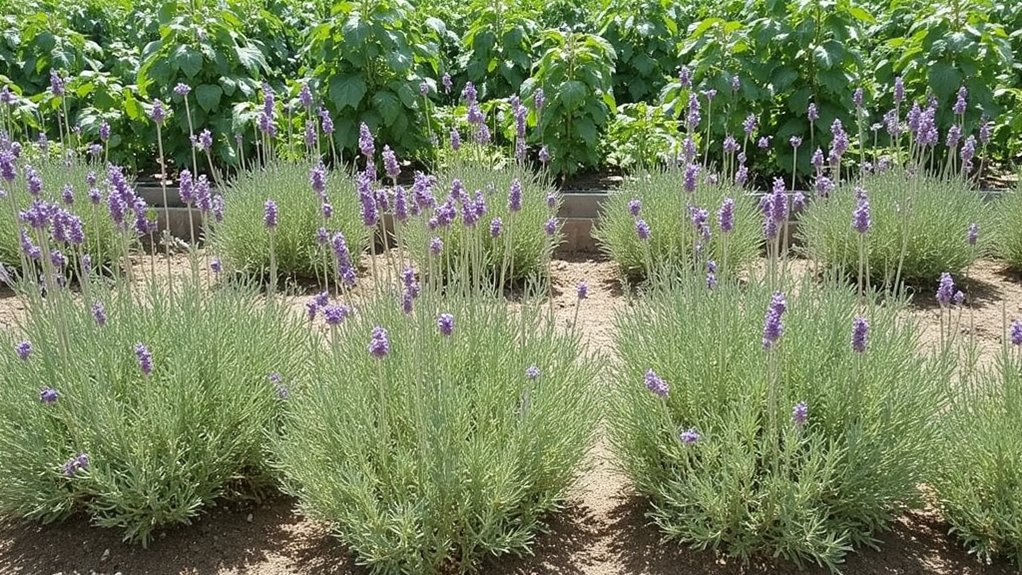
Let’s move on from basil and chat about lavender, another fantastic natural pest protector for your garden. You’ll love how this fragrant plant works double duty, keeping bugs at bay while beautifying your space.
Plant lavender near your veggies, about 12-18 inches apart, to deter pests like moths, fleas, and flies. Its strong scent messes with their senses, so they steer clear. Make sure you pick a sunny spot with well-drained soil, as lavender hates wet feet.
For best results, trim it back yearly, ideally in early spring, to about one-third its height. This keeps it bushy and effective. Add a few plants around patios or entryways, too; you’ll create a pest-free zone with a pleasant aroma.
Rosemary Pest Shield

Shifting to another herb, rosemary stands out as a powerful pest shield for your garden. You’ve likely got some in your kitchen, so why not use it outside? Its strong, woody scent repels pests like mosquitoes, cabbage moths, and carrot flies.
Here’s how you can use it effectively. Plant rosemary bushes near vulnerable crops, spacing them about 18-24 inches apart for good coverage. Alternatively, snip a few sprigs, roughly 6 inches long, and scatter them around plants. Replace these every 3-4 days to keep the aroma potent.
You’ll notice fewer bugs buzzing around within a week, trust me. Just water the plants regularly, about once a week, ensuring the soil stays slightly moist. That’s it, you’re set!
Cinnamon Powder Defense
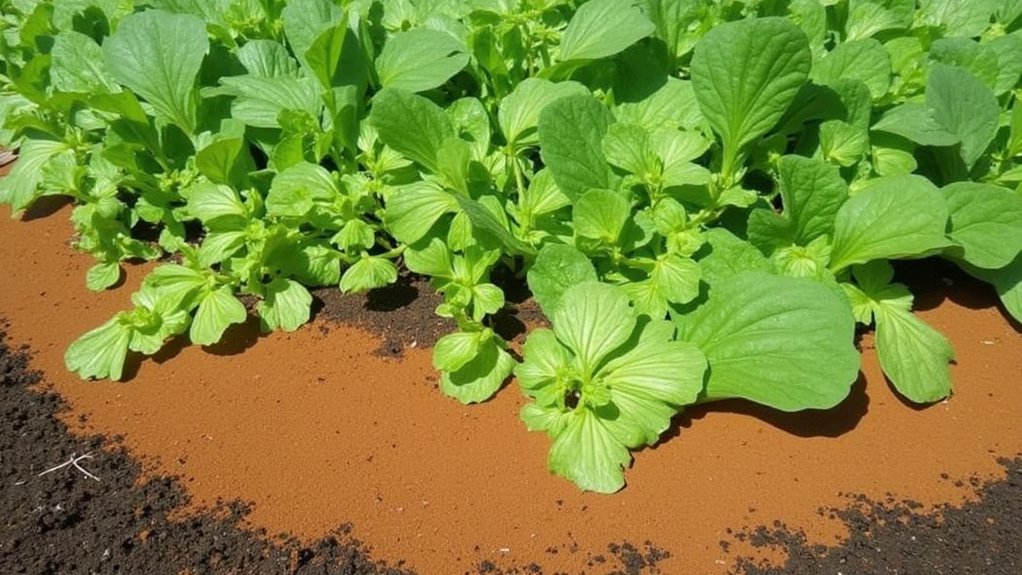
Moving from rosemary’s protective powers, you can also harness cinnamon powder as a surprising garden defense. It’s a simple, effective trick. This common spice repels ants, slugs, and even some fungi with its strong scent and natural properties.
Here’s how you use it: grab a small container of ground cinnamon, about 2 tablespoons, and sprinkle it lightly around plant bases. Focus on areas where pests creep in, like near garden borders or pots. Do this every 7-10 days, especially after rain, since water washes it away.
Don’t overdo it, though; too much can stress plants. Stick to a thin layer, roughly 1/8 inch thick, for safety. Reapply as needed, and watch those pesky critters steer clear of your greens!
Onion Pest Defense
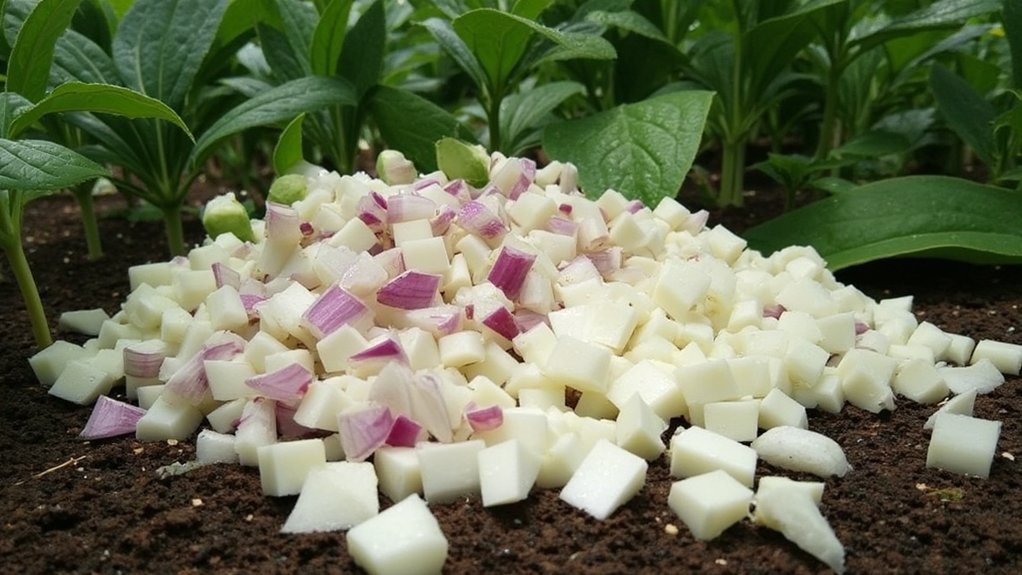
While cinnamon keeps pests at bay, you can also tap into the power of onions for garden defense. They’re not just for cooking; onions repel pests like aphids, slugs, and carrot flies with their strong scent. It’s a simple, natural trick!
Here’s how you do it: chop up one medium onion, about 100 grams, and scatter the pieces around your garden beds. Focus on areas near vulnerable plants, like carrots or lettuce, for best results. Do this every two weeks, replacing old bits as they decay, to keep the odor strong.
You’ll notice fewer pests within days, especially if you combine this with good garden hygiene. Try it out, and watch those pesky critters steer clear without any chemicals!
